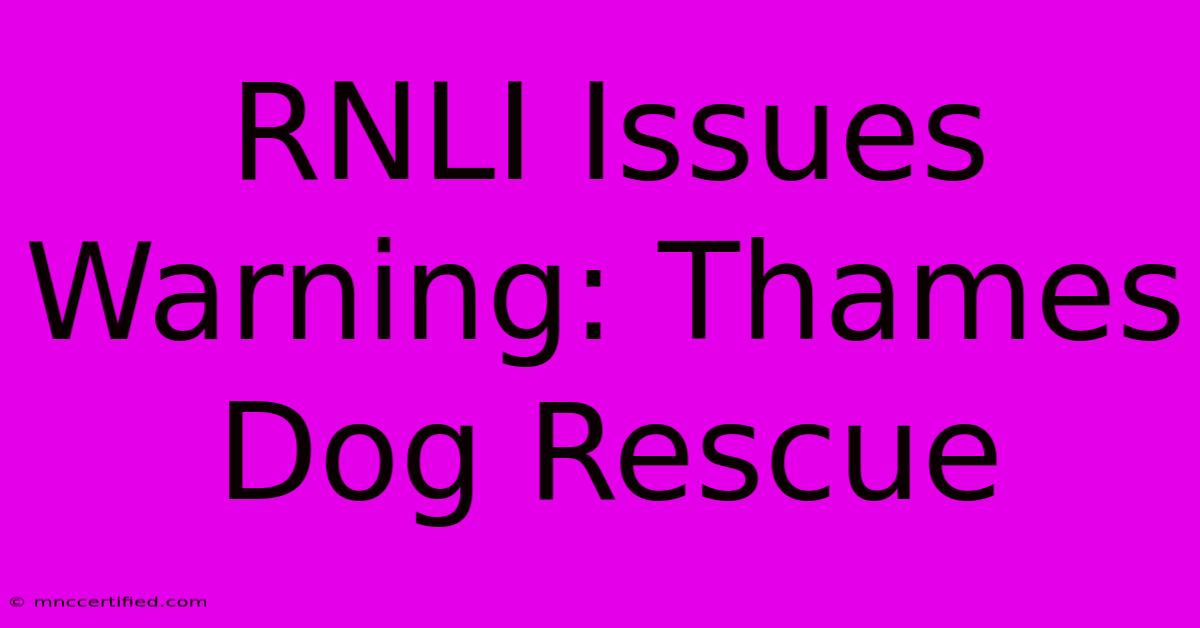RNLI Issues Warning: Thames Dog Rescue

Table of Contents
RNLI Issues Warning: Thames Dog Rescue - A Growing Concern
The Royal National Lifeboat Institution (RNLI) has issued a stark warning regarding the increasing number of dog rescues on the River Thames. This isn't just a local issue; it highlights a wider problem of irresponsible dog ownership near waterways and the dangers faced by both pets and rescuers. This article delves into the reasons behind this alarming trend and offers crucial advice for dog owners.
The Perils of the Thames for Dogs
The River Thames, while picturesque, presents significant dangers for dogs. The fast-flowing currents, unpredictable tides, and often-slippery banks pose a serious risk. Even strong swimmers can be swept away by the powerful currents, especially during high tide or periods of heavy rainfall. Furthermore, the cold water temperature can lead to hypothermia quickly, even for robust breeds.
Hidden Dangers Lurking Beneath the Surface
Beyond the obvious dangers of the water itself, there are hidden hazards that often go unnoticed. Submerged debris, such as discarded rubbish, old structures, and even underwater obstacles, can easily injure or entrap a dog. The riverbed itself is often uneven and muddy, making it difficult for dogs to regain their footing.
The Strain on RNLI Resources
The increasing number of dog rescues puts a significant strain on the resources of the RNLI. These life-saving operations require specialized equipment, trained personnel, and often, considerable time and effort. Every dog rescue diverts resources that could be used for other emergencies, potentially jeopardizing the safety of human lives. This isn't just about the cost of operations; it's about the potential loss of life-saving capacity due to an avoidable situation.
Why are so many dogs ending up in the Thames?
Several factors contribute to the rising number of Thames dog rescues:
- Lack of owner supervision: Many incidents involve dogs that have slipped their leads or wandered off unsupervised near the riverbank.
- Unpredictable dog behavior: Even well-trained dogs can be unpredictable around water, especially when excited or distracted.
- Inadequate knowledge of water safety: Many owners underestimate the dangers posed by the Thames and fail to take appropriate precautions.
- Chasing wildlife: Dogs with a strong prey drive may chase birds or other animals into the water, leading to them becoming stranded or struggling.
Staying Safe Around Water with Your Dog
The RNLI emphasizes the importance of responsible dog ownership around water. Here's how you can help keep your furry friend safe:
- Keep your dog on a secure lead: Never let your dog off the lead near water's edge.
- Be aware of your surroundings: Observe the river conditions before venturing near the water.
- Consider a life jacket: For dogs that enjoy swimming, a properly fitted life jacket provides added safety.
- Teach your dog the "leave it" command: This crucial command can prevent your dog from chasing wildlife into the water.
- Know your dog's swimming capabilities: Not all dogs are natural swimmers. Be extra cautious with less experienced swimmers.
- Never enter the water yourself: If your dog gets into trouble, call for help immediately. Do not attempt to rescue your dog yourself – you could put yourself in danger.
The Importance of Community Awareness
Raising awareness about the dangers of the Thames and promoting responsible dog ownership is crucial. By sharing this information with fellow dog owners and educating the community, we can collectively reduce the number of dog rescues and ensure the safety of both pets and rescuers. Spread the word and help keep our dogs safe.
Keywords: RNLI, Thames, dog rescue, water safety, dog safety, river safety, responsible dog ownership, life jacket for dogs, dog swimming, current, hypothermia, Thames dog rescue warning, RNLI warning, dog safety tips
(Note: This article is for informational purposes only and should not be considered professional advice. Always follow the specific safety guidelines provided by your local authorities and organizations like the RNLI.)

Thank you for visiting our website wich cover about RNLI Issues Warning: Thames Dog Rescue. We hope the information provided has been useful to you. Feel free to contact us if you have any questions or need further assistance. See you next time and dont miss to bookmark.
Featured Posts
-
M48 Winds Cause Severe M4 Congestion
Dec 18, 2024
-
Yankees Trade Rumors Bellinger
Dec 18, 2024
-
Petition 30 000 Pension At 60
Dec 18, 2024
-
Is Skibidi Toilet Coming To Fortnite
Dec 18, 2024
-
Scheffler Mc Ilroy Golf Match Showdown
Dec 18, 2024